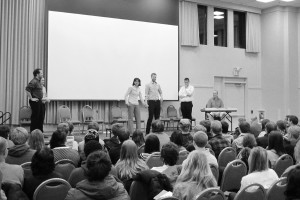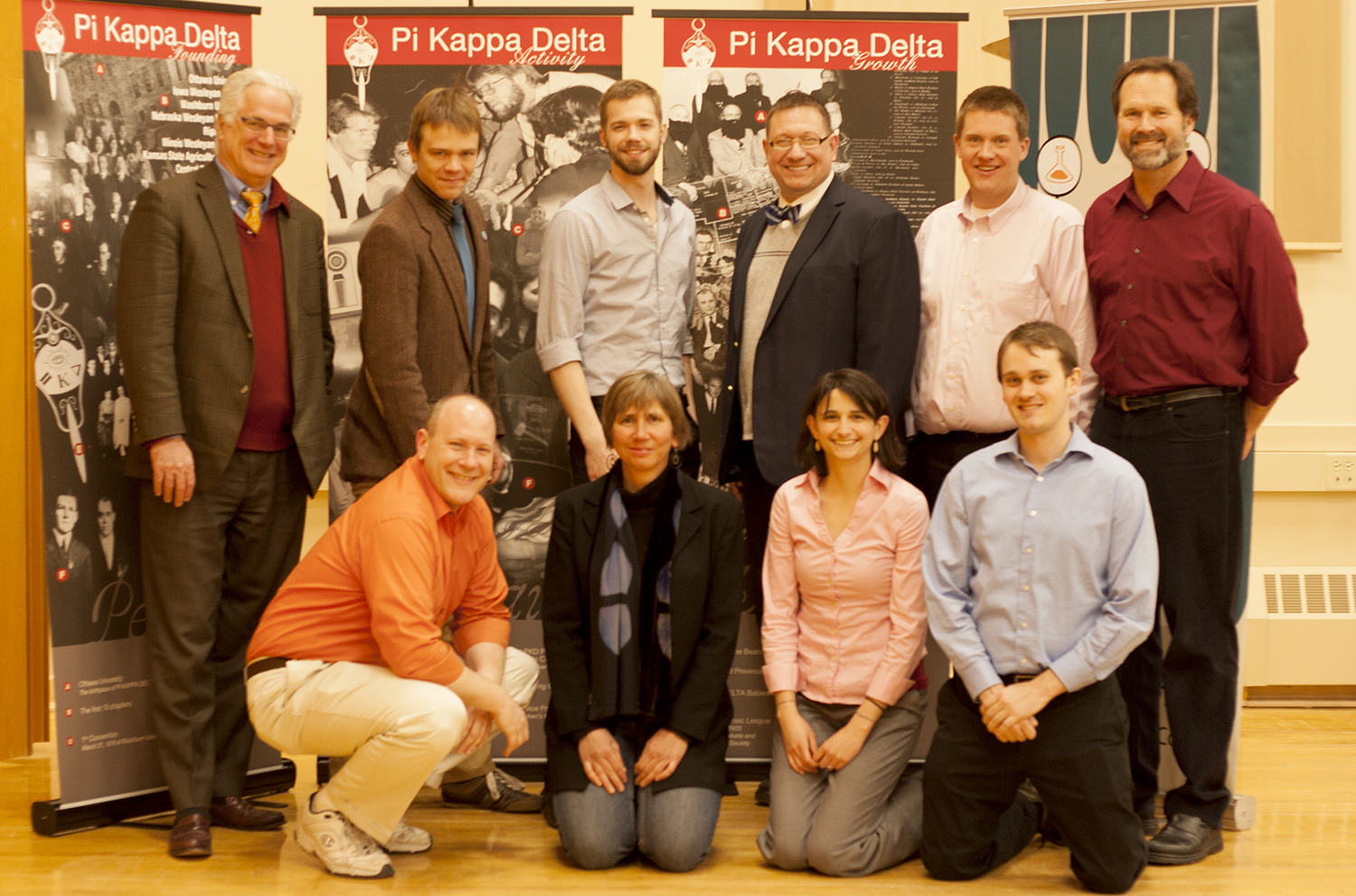Many students will find themselves asking, at some point in their educational careers, if college is really worth it, perhaps while slaving over a research paper or studying furiously for a final exam. On Wednesday, Feb. 26, a performance from the Minneapolis-based improvisation group, The Theater of Public Policy, joined in conversation to openly address and explore this question in partnership with guest speakers, Philosophy Professor Lisa Heldke and Economics Editor for National Public Radio’s Marketplace Money, Chris Farrell.
The performance was cosponsored by the Gustavus Philosophy Department and the Gustavus chapter of Pi Kappa Delta, a national honor society for speech and debate.
Professor Phil Voight, who serves as co-chair of the Communications Studies department and as President of Pi Kappa Delta, explains the importance of the “Is college worth it?” performance.
“We wanted it to be something that was relevant to our student body, that was timely, that was a serious public policy,” Voight said.
Through a combination of discussion between Heldke and Farrell, audience participation, and improvised comedic performance, the program examined the worth of a college education from financial and personal perspectives, weighing whether the college experience, and perceived benefits of higher education justify the increasing percentages of loans and student debt.
According to Voight, the comedic nature of the show serves as a unique method for exploring a difficult topic, reducing the defensiveness and tension which might arise from traditional debate, and Heldke also praised the group, noting that humor is a “brilliant medium” for communication.

The Theater of Public Policy group was established in 2011 by Brandon Boat and Tane Danger, a founding member of LineUs and former Editor-in-Chief of The Gustavian Weekly. Currently the entire cast is composed of Gustavus alumni.
“I want to make sure that both sides of the conversation get their fair share to be heard and taken into account – the practicalities and cost and that sort of thing like with graduation rates and how that has to do with the value of the college education. Also, that there are some things that you can’t put a price tag on,” Cast Member Maggie K. Sotos said.
Soto continues to maintain relationships with some of her former Gustavus professors.
“A lot of the advantages of a college education are in the community building and mentorships and those aren’t things that necessarily happen in a classroom,” Sotos said.
Farrell and Heldke both reflected upon the financial implications of committing to a college education, also weighing the benefits of entering into graduate study programs immediately after graduation with conflicting opinions. Ultimately, however, both were in agreement that college should be a time to explore and pursue interests, though Farrell emphasized that an eye should still be kept on the accruing debt in the process.
“I love questions like this that give all these members of the community a chance to come together and talk to each other about things that really, really, do matter to all of us, where we all get to bring our smartest selves to the table. So as I said in the little GACtv spot, I really hope that it leads students to reflect more and to be more critical participants in their own education,” Heldke said.

Voight expressed a desire that those who attended the performance were prompted to evaluate their own education, gauging whether they are fully taking advantage of the college experience.
“If you simply go here and go to class and do your assignments and go home I’m not sure you really should be here. You could get a perfectly fine education at any of the other twenty-five hundred institutions in the U.S., but I think you’re really leveraging your Gustavus education if you are heavily involved in service organizations, in extracurricular activities, if you are going to all of those events we have [on the Gustavus campus],” Voight said, sharing advice he gives his FTS students.
While it is up to each student and audience member to personally weigh the worth of college, Voight said that he hoped the performance of The Theater of Public Policy inspires those in attendance to pursue individual passions, seizing opportunities for innovation.

College is worth it, a two year degree that is.
When you go for your two year degree (Associates) you will have cheaper credits, smaller class sizes and the ability to transfer to get your Bachelors. You can check out why starting at a community college is better than starting at a university at nrgtitans.com/communitycollege.html
You could be the most amazing performer/dancer in the United States, but someone with Julliard experience could easily be considered.